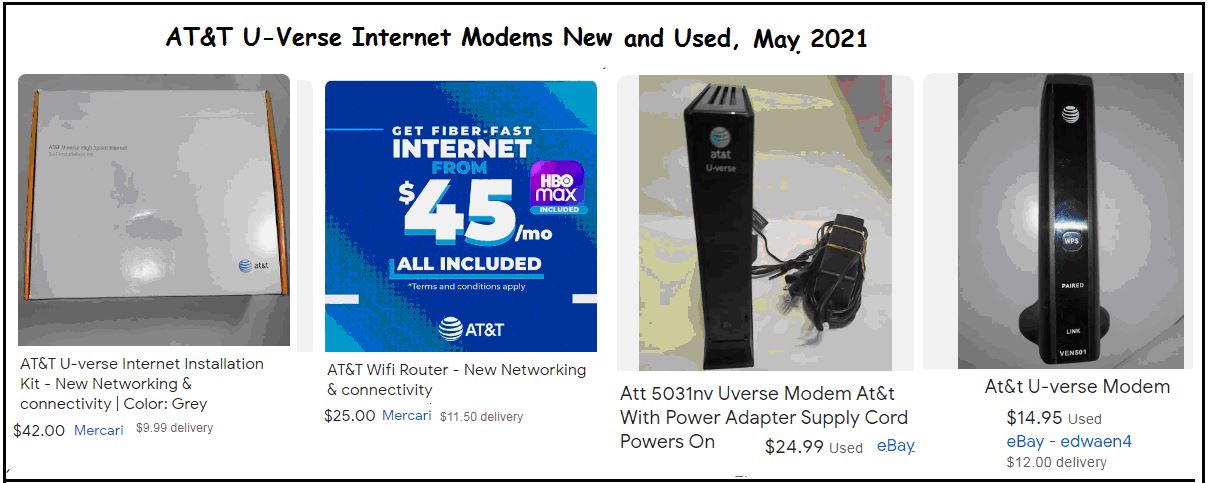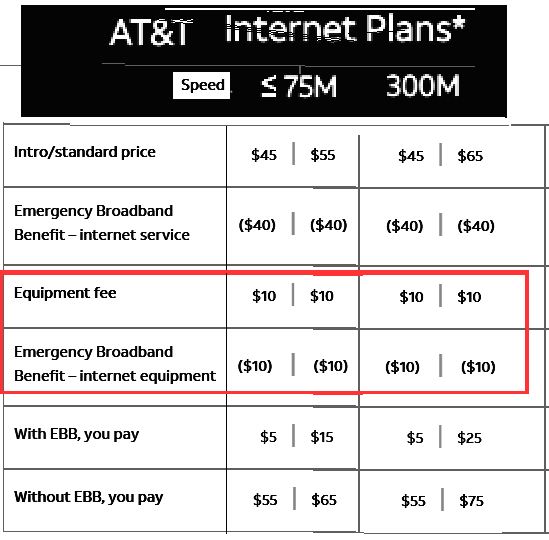 By B.N. Frank
By B.N. Frank
Industry lobby groups insist that Americans are paying less not more for internet services. NOPE. Not only that – a lawsuit filed against the Federal Communications Commission (FCC) by a group of Telecom Experts (The Irregulators) established that Americans have been overcharged for decades for telecommunication-related services that many still haven’t received.
Irregulator, Bruce Kushnick, has written dozens of articles about this over the years. Thanks to Bruce for continuing to report about how all customers are still being gouged including by the Emergency Broadband Benefit (EBB) (see 1, 2, 3).
From Medium:
$500 Internet Modem Rental? Low Income Households and America’s Broadband Emergency (EBB)
This is Part 2. (Click for Part 1.)
AT&T charges $10 a month, $120 a year, for an internet broadband modem that appears to cost AT&T $20-$30 at wholesale rates. That’s a lot of extra profits to take from the Emergency Broadband Benefit, EBB, government subsidy for low income families, don’t you think?
And regardless of the EBB program, if you have used an internet broadband service from AT&T over the last 4 years, this comes to $480. We need to add that AT&T also gets to write off this piece of equipment, an additional benefit to… AT&T. This is a Big Telecom & Cable, industry-wide problem for America.
NOTE: The internet modem is a piece of equipment for connecting a household to the internet, but there are other communications equipment, such as the cable TV box or the wireless ‘router’, and they, too, overcharge customers with ridiculous amounts of profits coming from equipment that cost a fraction of the annual costs charged to customers.
The IRREGULATORS Position: AT&T et al. should not be allowed to gouge customers in general with added fees, but in this case, the companies should not be allowed to charge the government inflated pricing that is to subsidize low income households. Worse, once the EBB program ends, these low income families will be faced with paying excessive retail rates — and it is these very issues that caused the Digital Divide in the first place.
Part 1 Discusses the FCC’s New Emergency Broadband Benefit and the Issues.
The EBB, Emergency Broadband Benefit, is a government subsidy program giving out $3.2 billion to broadband providers to cover discounts of up to $50 a month for qualified low income households to get online; ($75 a month to households on Tribal lands). This money is supposed to focus on low-income children being able to go to school online, to provide critical medical services, and for those low-income adults who have to stay at home and work online.
As we discussed, AT&T’s wireline broadband internet service is advertised at $45.00 but this price is missing 30–40% of the actual expenses a customer pays.
The fine print says:
“INTERNET OFFER: Additional Fees & Taxes: AT&T one-time transactional fees, $10/mo. equipment fee, and monthly cost recovery surcharges which are not government-required may apply, as well as taxes. See att.com/fees for details. Installation: $99 installation for full tech install. Credit restrictions apply. Pricing subject to change. Subj. to Internet Terms of Service at att.com/internet-terms.”
The Price of the Internet Broadband Modem and Your Connection to Get Online.
As we mentioned, there are many different boxes that are used to connect America to online and cable services, including cable modems (which are the same as these broadband internet modems), wireless routers and hot spots, not to mention the cable TV set top box, or the “DVR”, among other related equipment.
We’ll focus on the internet broadband modem and its pricing.
AT&T Internet Modem Prices Online and eBay.
We did a basic search for ‘AT&T modem’ on Google and eBay and found that there were lots of both used and new modems, ranging from as low as $15 to $40.00 for a new modem or more. (NOTE: We attempted to find equipment that was broadband internet only and capable of the speed of the FCC standard, 25 Mbps down and 3 Mbps up. Much of the equipment combines many of the features and can cost a great deal more.)
Retail Price for the Box
We tracked down AT&T’s pricing and found their DSL modem was $75 and the wireless gateway cost $100, nice round numbers.
Wholesale Price: At Least 1/3 of the Retail Price
We asked experts and the consensus was — if AT&T is selling the modem for $75-$100, the wholesale prices would be in the range of $25–35 dollars — or less; about 1/3 of the retail price.
$10.00 Cost to Customer and Issues.
This is AT&T’s basic chart for pricing of AT&T’s Internet Plans being offered as part of the EBB. Notice there is a line item of $10.00 for equipment, and that the speed can be less than 75 Mbps, or 300 Mbps (yet the modem price is the same).
As we mentioned in the previous article, this $10.00 is NOT in the advertised cost of service; it is not in the promotional price, either. And, the service doesn’t work unless the customer rents this modem or buys one.
USA Today gave a summary of the ‘cable modem’ pricing, which are the equivalent of the wireline internet broadband modems (with technical caveats).
“Consider the cable-modem fees at the three biggest cable internet providers in the most recent quarter, per Leichtman Research: Comcast, Charter (sold under the Spectrum brand) and Cox.
Comcast’s Xfinity service now charges $14 a month — up from $13 a year ago, versus $11 two years ago, compared to $10 in 2017 and $8 before then.
Spectrum still doesn’t charge for a modem — which meant that Time Warner Cable customers saw their old $10/month fee go away when Charter bought that firm — but it now invites customers to rent a Wi-Fi router from them, labeled as a $5 Wi-Fi service fee. (Don’t ever pay that.)
Cox charges $10.99 a month, up from its former $7.99 rate that was a modest increase from $6.99 in 2017.”
(Note: Spectrum in NY does charge for the modem, $10 a month.)
How Much Are We Being Gouged?
- a) We just presented a group of AT&T compatible broadband internet modems available today — and they range from $15-$25 used, $25-$40 new, (though we can’t vouch for their quality).
- b) Meanwhile, AT&T is charging $75-$100 for a modem or a wireless gateway.
- c) We estimate AT&T’s wholesale price is 1/3 of the retail cost — $25-$35 total.
- d) AT&T also gets a tax write off for this equipment.
- e) AT&T’s EBB service is charging $10 a month — $120 a year.
Do the Basic Math
- If AT&T only charged $2 a month, at this wholesale rate, the equipment would be paid back, in full, over 1 year and the next year it would be pure profit.
- But, if this model is correct, then AT&T is gouging customers, especially low-income families and the government that is subsidizing the EBB.
Thus,
- At $10.00 a month, after 3 months the equipment is paid for, there is a tax saving, and in 9 months they make $90 of pure profit; Year 2 and forward it is all profits from a product that is not even part of the advertised price.
It Wasn’t Always $10 a Month.
In 2012, the Spectrum-Charter modem in New York City only cost $2.50 per month but jumped 140% by 2014 and by 2018 it went up 300%. These price increases appear to be standard industry increases.
As USA Today wrote:
- “Comcast’s Xfinity service now charges $14 a month — up from $13 a year ago, versus $11 two years ago, compared to $10 in 2017 and $8 before then.”
This comes to $168 for 2020; $840 for 5 years — for a $25-$35 wholesale product.
But Customers Can Replace This With Their Own Box, Right?
Industry analyst Karl Bode wrote:
“FCC Formally Kills Rules that Would Have Brought Competition to the Cable Box”
This article discussed that in 2016 there was a plan for alternative cable set top boxes, known as “CableCARDs, but the plan was killed off in 2020.
According to the article, the industry supposedly gets $21 billion in rental fees.
According to Bode, in 2020, the FCC, in a unanimous decision, ‘eliminated’ rules that allowed customers to use competitive ‘CableCARD” devices that were used for DVRs, and it killed off the proposal to bring more cable-box competition.
The FCC’s report gives two significant numbers. — i.e., about 1% of the population took advantage of the change; only ½ million used an alternative, but there was 49 million cable subscribers.
- 456,000 cableCARDs were in place in the first quarter of 2020
- There were 48.6 million cable subscribers in 2019.
Conclusion
While it may be OK with some of the broadband providers to allow customers to have an alternative internet modem, the idea that low income families requiring assistance for their home broadband service would go out and have the know-how to purchase a modem as well as the loose cash to pay for it — is just not an option.
The Digital Divide was created, in large part, because of the failure of our communications companies to offer affordable prices for broadband for all.
While there is a necessity for helping low income families, we need to fix the US communications prices. America is paying 5–20 times more than overseas, and if prices were adjusted to remove the overcharging, low income families would be able to afford high speed services.
Moreover, the ability to add charges for modems, set top boxes, and other devices that increase the service 30–50% above the advertised price — needs to be halted immediately.
In fact, the Benton Foundation published a short paper addressing the issue: “Why Low-Cost Devices Matter for Broadband Policy”.
The second part of this, however, requires that areas that were never properly upgraded are finally brought into the 21st Century. We should not use government funding to do this but to halt the billions, per state, in cross-subsidies — and to investigate how AT&T & Big Telecom have allowed the entire US wired communications public infrastructure to deteriorate.
The Federal Communications Commission (FCC) is supposed to protect Americans from the telecom and cable industries. The agency has instead catered to these industries for decades (see 1, 2). Various lawsuits have been filed against it because of this (see 1, 2, 3, 4, 5, 6, 7, 8).
Activist Post reports regularly about The FCC, Big Cable and Big Telecom. For more information visit our archives.
Become a Patron!
Or support us at SubscribeStar
Donate cryptocurrency HERE
Subscribe to Activist Post for truth, peace, and freedom news. Follow us on Telegram, SoMee, HIVE, Flote, Minds, MeWe, Twitter, Gab, Ruqqus and What Really Happened.
Provide, Protect and Profit from what’s coming! Get a free issue of Counter Markets today.







Be the first to comment on "Emergency Broadband Benefit (EBB) Allows Big Telecom/Big Cable to Continue Overcharging Americans; Monthly Modem Fees, etc."